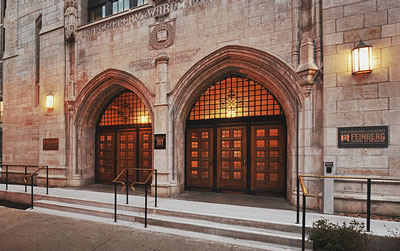Author: kwm107
-

A New Weapon Against Cancer Metastasis
Northwestern Medicine scientists have discovered a new compound that halts the spread of multiple types of cancer cells.
-

Pioneering Hematologist to Receive 2018 Nemmers Prize in Medical Science
Stuart H. Orkin, MD, an investigator of the Howard Hughes Medical Institute at Boston Children’s Hospital and Dana-Farber Cancer Institute and a professor at Harvard Medical School, is the recipient of the 2018 Mechthild Esser Nemmers Prize in Medical Science at Northwestern University.
-

Chicago Helps Launch All of Us Research Program to Advance Precision Medicine
On May 6, the Illinois Precision Medicine Consortium hosted a launch event at Chicago’s Millennium Park, one of many simultaneous events held around the country to mark the program’s launch.
-

Accelerating Pharmaceutical Discovery
NewCures at Northwestern University is a novel accelerator working to identify promising potential therapies in development, fund research into their viability, and promote their development as new drugs.
-

Medical Student Applies Consulting Background to Healthcare Problems
Third-year medical student Ben Peipert co-founded Second Opinions, a student-run pro-bono consulting group, and brings his consulting skills to his research on quality of life in endocrine disorders.
-

How the Brain Anticipates Errors and Encodes Expectations
New study demonstrates the midbrain’s role in encoding identity errors and how those are used to update expectations in the orbitofrontal cortex.
-

Traveling to Support Medical School Diversity
Students, residents, faculty and staff recently traveled to San Francisco to attend the Student National Medical Association annual conference for current and future underrepresented minority medical students.
-

Three Northwestern Faculty Named Elite Medical and Biological Engineering Fellows
Three Northwestern faculty members have been elected to the American Institute for Medical and Biological Engineering’s College of Fellows.
-

Northwestern Medical Student Chosen for Professional Ethics Program
George Freigeh was one of 14 medical students chosen for Fellowships at Auschwitz for the Study of Professional Ethics, to participate in a two-week program in Germany and Poland using the conduct of physicians in Nazi-occupied Europe as a way to reflect on medical ethics today.
-

When Kids’ Autistic Brains Can’t Calm Down
A new Northwestern Medicine study shows how a breakdown in the development of inhibitory neurons helps explain autism’s link to epilepsy.





